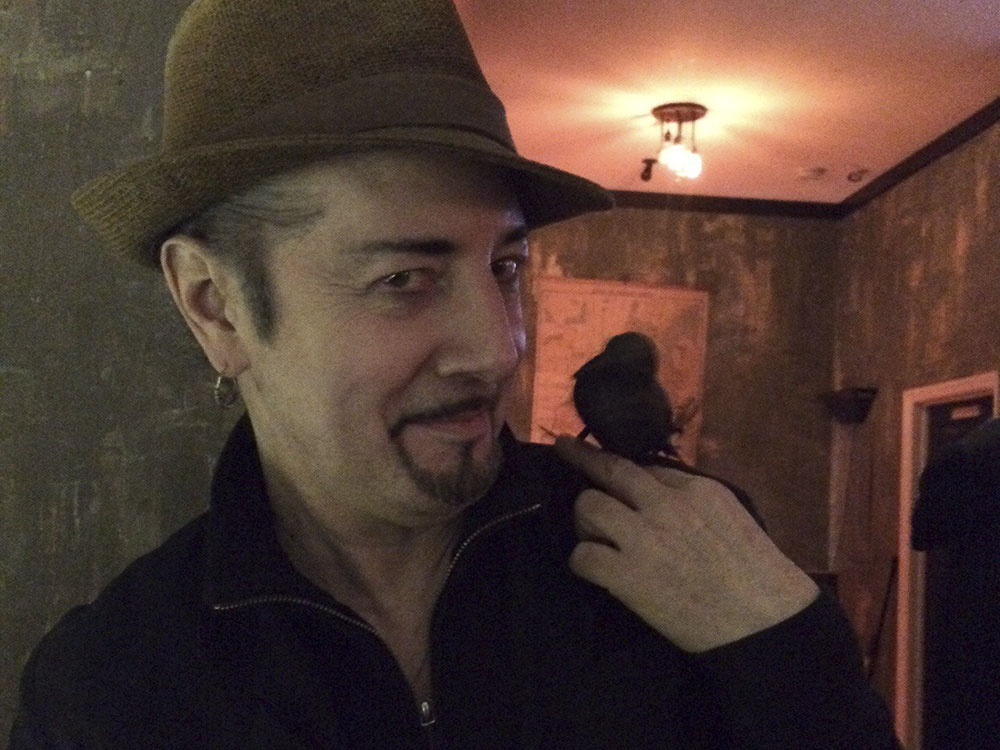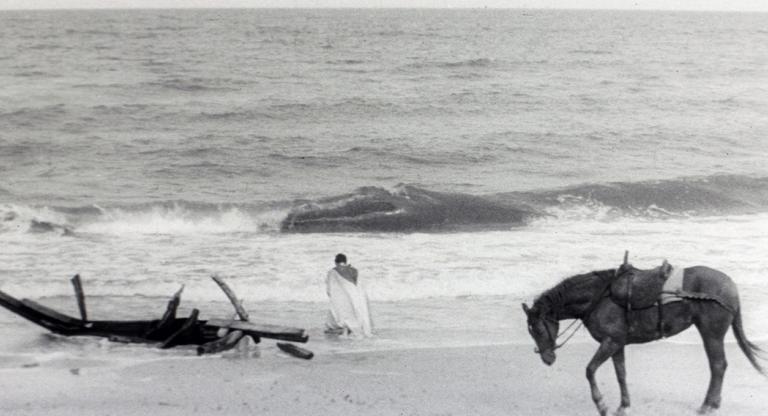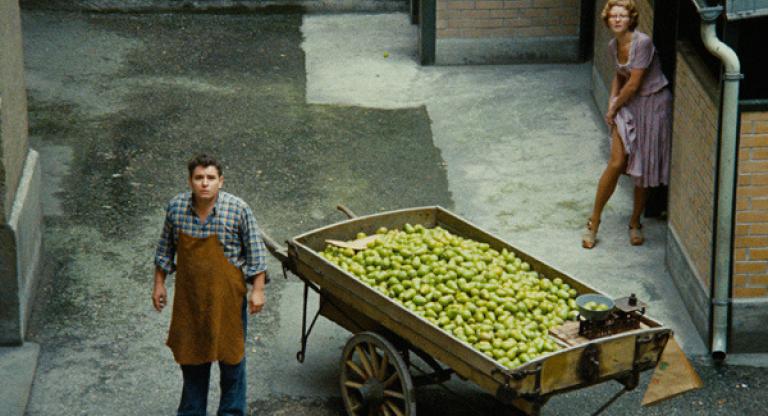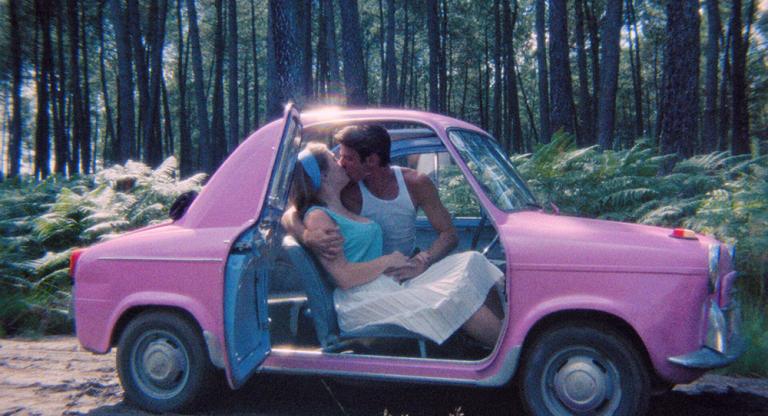On this longest night of the year, two lights of NYC’s underground film scene align in syzygy. Revolving projection-performance group Optipus digs into the shared prints of the Mushroom Archive, an informal collective of film collectors, for a day-long splicing session, culminating at midnight in a collaborative winter solstice screening at Light Industry. Artist, poet, and freegan sartorialist Bradley Eros, an ongoing member of both groups, kindly let me bother him about the Archive’s origins, Optipus’s inspirations, and the joys of serendipitous alchemy.
Danielle Burgos: I know the Mushroom Archives existed prior, but mycelia's really having a moment.
Bradley Eros: I know, right? Benji, who works here [at Anthology Film Archives], found this [book of mushroom types] on the street just last week and gave it to me.
DB: Be careful with that! My friend's high-school biology professor had that book. He knew what he was doing, and he still managed to poison himself twice.
BE: Yeah, I'm not likely to do that. I know some people that know a lot about it; even those people will say that almost every mushroom has a doppelganger, a deadly doppelganger. I was looking at the Audubon guide before, which my roommate had, and she was really into it. And so I wrote all this poetry based on their descriptions of the different mushrooms. You know, in neither of [these books] do they actually use the word hallucination. They say, ‘causes delirium’, ‘causes spasms’, ‘causes nausea’, ‘causes vomiting, may cause death.’ So I wrote a whole bunch of things based on that and the way that they describe the effects of them and, you know, all the beautiful shapes and things like that.
Knowing what I know of it— I mean, there's a lot of people that know a lot more about it. You know what John Cage wittily says? I don't know how true it is, but he says the reason he got into mushrooms is that it's the next word in the dictionary by music. Though, the word mushy is actually between the two.
My friend Pam Kray made a film called Mushroom Seekers [2002]. I'm actually in it. She lived in Prague and San Francisco, and those are two hotbeds of mushroom [culture]. In Prague, whole families go out and learn— go into the forest and go foraging. It's very common there for people to pass it on in their family to their children, things like that. At that point, I decided to make a remake of Warhol's Eat [1963], which is Robert Indiana eating a mushroom really slow. But I wanted to do it with a hallucinogenic mushroom. So we restaged it where I'm dressed like him with a plant, in the hat, and eating something. But if someone knew, they would know that that's what I'm eating instead of whatever he's eating in that film.
I had this revelation while tripping on mushrooms. My friends upstate had a 100-acre place with a pond and woods and mountains and everything. And so we built a sweat lodge there. At one point, while tripping and building the sweat lodge out of these birch bark trees, I was inside digging the pit to put the hot stones in. And I looked through my legs and I saw Jeannie [Jeanne Liotta] in the pond, and I had this revelation about the upside-down image. I thought, Oh, here's an interesting thing: the Indigenous sweat lodge as a place for people to capture, have visions; yet in the European tradition, the camera obscura is the place to capture visions. So I had this trip about the relationship between the Indigenous sweat lodge and the European camera obscura as a place to fix images, in a way, or to have visionary experiences. The sweat lodge itself resembles the dome of the mushroom, and the inverted pit of it also resembles it in reverse. So you have this whole negative/positive thing happening there. I thought, Oh, that's an interesting point to make, this connection between part of the birth of photography and relationship to all these pre-cinematic things.
I've written some texts on ancient cinema going back to the Egyptians and the heliographic society there, and the idea that there's slits in the pyramids and the hieroglyphs are moving images. Peter Lamborn Wilson (Hakim Bey) often talks about how the hieroglyphs are actually musical. If you knew how to read them, you would hear sounds. So not only is the sun coming into the pyramids with hieroglyphics, but it's actually sound film in a way. So the experience goes back to that.
Then I took that through Alhazen, who wrote a book on optics in 1100. He's the first person that understood the way the eye works, in a way, the idea of it being this chamber. So camera obscura comes from him in a way. He was a mathematician/scientist in Persia at the time. There's all this pre-history of cinema that comes through different cultures. So when the idea of the mushroom was coming through, other cultural information trickled in. Almost every culture has some relationship to [the mushroom], much as they do to hops and beer.
So that was interesting to then read about the mycelium, and the whole idea of that as being an underground network. The idea of the fruiting body, the visual fruiting body as the mushroom— that's obviously the cinema part that relates to the underground network, right? One of the films that someone gave me that’s now part of the Mushroom Archive is one called Microscopic Fungi. And that relates more to yeast and bread and beer. Then Jon Dieringer gave me this beautiful film that's just called Fungi. It's funny, but when we started doing the Mushroom Archive originally it wasn't thematically supposed to be about mushrooms. That was kind of the metaphor of it, you know. But it turned out that many people had mushroom-related films.
Most of my experiences of shrooming are very intensive ones. I don't microdose. Many young people I know do, and seem to like it.
DB: It does genuinely help with depression.
BE: Yeah, yeah. I understand that. It's just not really my approach to it. I mean, the thing that's probably most significant and memorable about it is being really deep in the country and having experiences that are really related to decay and death. Really meditating on that and not having fear of that, but making that part of the reason for doing it. That's why I want to go there with it. I really want to look at that aspect of it and see, is there space for that?
DB: Is that why you wanted to do this for the solstice?
BE: No, I think Ed [Halter, of Light Industry] knew that during the pandemic I did events for every solstice and equinox. And what I liked about it is, look, it happens when it happens. It was three in the morning one time, it was five in the morning, it was midnight. I don't have any control over that. The event happens when the thing happens. Some people are game for that, and there was this huge park that I could go to. People were there all the time in the daytime, lots of people playing sports, whole families hanging out, but almost everybody left it at dark. And so I could go there at midnight and almost no one would be there even though there could be hundreds of people there in the daytime. It was right between the railroad tracks, the freight trains, and the subway trains. It was a really great location, called Joseph Mafera Park [in Ridgewood, Queens]. I could look out my kitchen window—it was two and a half blocks away—and go, Oh! an amazing sunset, or amazing sunrise. So I would basically go for sunrise and then go to bed, then get up and go for sunset. That's where we ended up doing these events. And so I think Ed just thought I would be game for that, you know, calendar-wise.

DB: Because it is the winter solstice, the darkest time. Is the idea that you're pinpointing the darkest time to mark it and move past it?
BE: Well, I think it's because we're going to be using light and...
DB:...at Light Industry.
BE: Light Industry! But that we'd be doing projection. Even though that room is pretty sealed in. It's interesting that it's an enclosed space. We did a couple of versions, and Ed was at one that we did on the rooftop at Synesthesia of the Mushroom Archive, which is basically inviting people who were collectors. In that case it was like, Oh, bring a gem from your collection. There's no theme at all. Just bring something that's not super long and that you really want to show off.
Optipus is, you know, usually we're performing with things and it could be original footage, shot footage . . . At one point Optipus was all analog filmmakers and mostly people that worked at Anthology and people that I knew here, plus Lary 7. It was all people showing films and maybe making loops out of them and maybe cutting them up. Then it evolved over time where Joel Schlemowitz and Larry and I were all working with magic lantern slides as well, and we all had our own collection of that. Sometimes we would integrate overhead projection stuff you know, like with Genevieve [Havemeyer-King] or with Rachael [Guma]. Eventually we ended up using video, too. We incorporated live video of people like Scott Kiernan. And now there's a number of young people from Anthology that are part of it who were just starting to do that—or maybe haven't really done performative stuff, but they're making experimental stuff, and they're game. Some people are just a part of it as musicians. The largest version, I think, was the thing we did at the Knockdown Center. There's 25 of us or so, and so the group kind of keeps morphing in terms of who is available and who's interested, and who might just be in one project . . .
DB: For this event, anybody who's participating by viewing is also, by extension, part of the group?
BE: Yeah. We're going to spend at least 8 hours trying to make a composition. The unknown element is what people might bring from the Mushroom Archive that could be performed by Optipus. When we rehearsed it, and when we did the recent thing at Mono No Aware, we shut the power off a number of times. So one question is whether we actually have the power and the fuses. There is a way to figure all that out, but I don't necessarily know whether [Light Industry] has the capacity for that. I think Ed's realizing, Oh, okay, this is maybe involving more people than I thought it was. I think he originally thought the Mushroom Archive is one thing and Optipus is another thing. This is a rare combination of the two. I don't know whether it has a future. I don't know whether it makes sense. Probably the next time I do something with the Mushroom Archive will be a situation where people are just showing off some gems and meeting as a soirée in a way.
DB: I do think it's appropriate. That's the thing I like about a solstice is it's supposed to be a group event.
BE: Yeah.
DB: You're supposed to have everybody come together for either celebration or banishment. Or both, in this case.
BE: I think it's basically connecting people. So in that sense, it was really the mycelium. I realized that I knew, I dunno, three or four or five dozen people who collected film prints, starting with people like Craig Baldwin. I probably have, I don't know, three or four hundred things, mostly that people had given me. I didn't even have time to look at all of them. I mean, Mr. E [Michael Evans] and different people would say, "Oh, here's a bunch of porn", or "Here's a bunch of home movies," or at one point I ordered a bunch of films from a Texas school library. It was mostly science films I was interested in so I mostly just ordered them by title, and I got a box of like thirty, forty different things and then made found-footage films out of them.
A lot of films would have two minutes that are really brilliant, and the rest is really boring to me. I don't mind cutting them up, because I think they're really boring and I don't really care about ever watching it again.
DB: Part of it is not anticipating, but is there any reason why you wanted to do this as this combination archive dig / group event? Was it just that Light Industry would let you guys do this with so few parameters?
BE: Well, yeah. I usually like to say I have something to do, and I want people to say yes. And then they say, What is it? I don't really want to convince people that they should do this thing. If they just say yes, [then] let's do this.
I don't know if [Ed] knew originally about the Mushroom Archive and Optipus together, because it never really happened together.
The first part of it is really about a DIY form of an archive, which is also decentralized, but it basically is the idea of keeping things. But the whole second part of it is this essay that I wrote a number of years ago, which is basically [about] not keeping things—that film should have more like a human cycle of decay and death. So the experience of cinema should be something that actually has a life and death. It isn't meant to be forever.
DB: I'm in the liminal generation that very clearly remembers before and after having a computer in the house. Everybody after me, I feel like they're stuck in the bardo. They're stuck in this weird nothing-dies state; nothing can be reincarnated. The younger generation has a really good grasp on remixing and recreating; things are there for them to play with even if they are IP for somebody else. But nothing dies. Your dumb memes from sixth grade are going to be online unless you go delete them. And even then you might not be able to.
BE: Yeah, though there is a thing called secrets. Like I have secrets and my best secrets are secrets that I don't tell anyone. I won't ever worry about someone else telling it because I have secrets that no one knows. And I believe in secrets. I mean I believe in telling people all kinds of intimate things, but I also believe in having private space that's unsurveillable in some ways. We have a DJ thing called Vampirates and like, what part of Vampirates don't you understand? Yes, we're going to steal your things. We're going to remix it. We're going to make something from it. In that group, which is with Rich Sylvarnes, he basically does rhythms, and I do all the surprise elements. And I've sampled hundreds of records. He doesn't know what I'm going to do. So I play samples and everything is stolen, everything is pirated. Everything is vampired.
DB: ‘Grafting’ feels fair. With stealing, there's an empty space where the thing once was. With copying or grafting, there is another thing there. The original’s still there. There's something else over here.
BE: I mean, I like misunderstanding. I think some of the greatest things come from misunderstanding. I'm talking about the misunderstandings that come between different cultures. Some of the greatest stuff we know came from that mistranslation, that misunderstanding, and produces some third thing that's not an out-and-out stealing, it's actually using in a way that you can't predict. Most of the criticism of pirating is criticism of capitalism and criticism of colonialism, and that's totally legit. But that's not really what I'm talking about when I talk about how the misuse of things often creates something that you couldn't predict.
The Mushroom Archive will be presented by Optipus tonight, December 21, at Light Industry.



